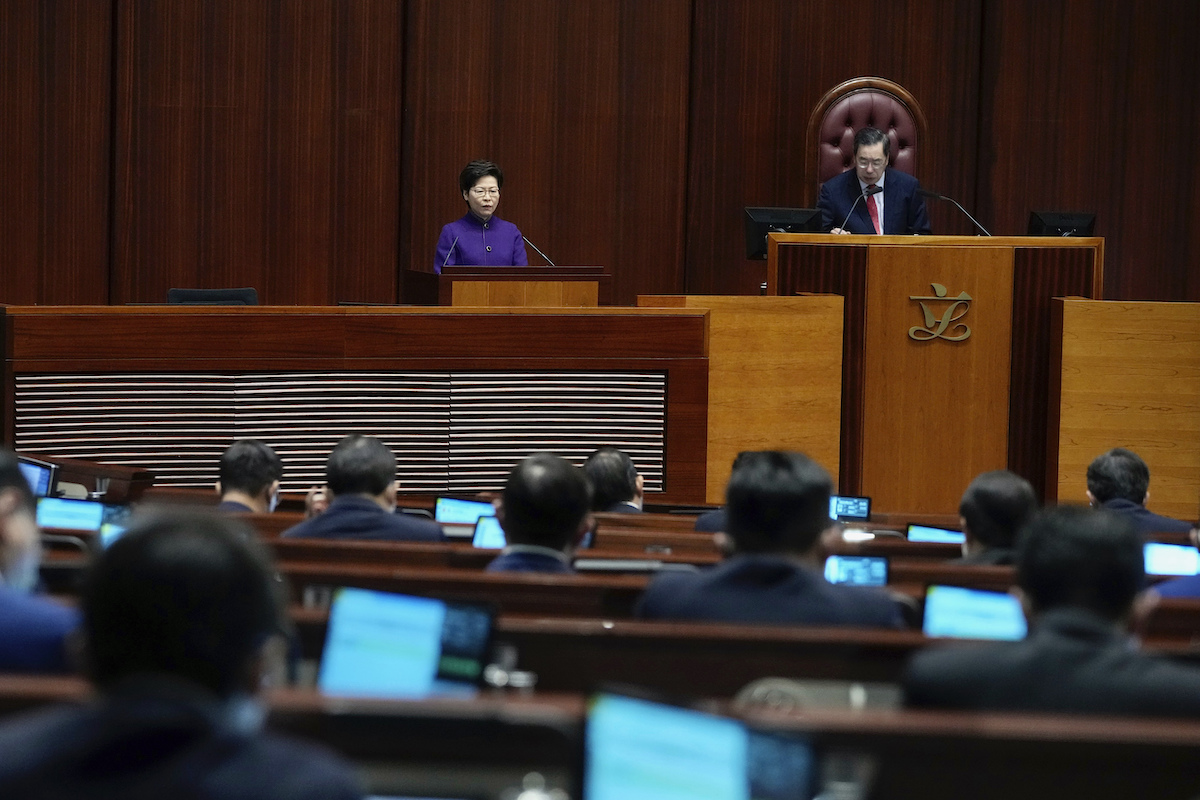The People’s Republic of China (PRC) is completing the destruction of the old Hong Kong. The last vestiges of free expression and democratic choice are disappearing.
On January 4, the media site Citizen News closed due to the deteriorating legal environment. The organization explained: “We all love this place, deeply. Regrettably, what was ahead of us is not just pouring rains or blowing winds, but hurricanes and tsunamis.” Citizen News’ decision came just days after the Hong Kong government raided another independent media organization, Stand News, froze its assets, arrested seven current and former editors, and charged them with sedition.
Hong Kong Chief Executive Carrie Lam, now acting overtly as a PRC hireling, declared: “Inciting other people … could not be condoned under the guise of news reporting.” However, she assured her critics that sending more than 200 police to shut Stand News had “nothing to do with journalistic or media work.”
Every commemoration of the 1989 Tiananmen Square Massacre, including artwork and a museum, is being dismantled. On the day Citizen News closed, barrister Chow Hang-tung was sentenced to 15 months in prison for urging Hong Kongers to attend last year’s annual Tiananmen Square vigil, which had been banned by the local authorities. She already is serving a year-long sentence, having been convicted along with Jimmy Lai and others on similar charges for the 2020 vigil. She told the court: “It can be foreseen that the public space to discuss June 4 will disappear entirely. Tyranny is greedy, red lines will keep expanding.”
Moreover, the newly elected Legislative Council, which convened on January 3, has been brought under the PRC’s complete control. The old LegCo, though dominated by China-friendly members, was raucous and open. After Lam’s introduction of an unpopular extradition bill that would deliver Hong Kong defendants to China, a popular tsunami in 2019 delivered control of most district councils, which rarely had been seriously contested in the past, to pro-democracy forces.
With democrats expected to win the 2020 LegCo election as well, the Hong Kong government canceled the vote, barred “unpatriotic” candidates, ousted “unpatriotic” members, and arrested opposition activists for having arranged an informal primary election. The latter, it turned out, counted as an attempt to “overthrow” the government, violating the National Security Law imposed by Beijing. Then the PRC revamped the LegCo, changing its composition and mandating that only “patriots,” i.e., Chinese Communist Party cronies, could run for office.
Hong Kong’s legislative elections were held on December 19, 2021, and suffered from a record low turnout of 30%, compared to 71% for the district poll and 57% for the 2016 LegCo contest, which occurred two years before the spike in democracy activism. Lam dismissed the drop as meaningless, likely reflecting Hong Kongers’ great satisfaction with her government! In a desperate attempt to bolster the vote, her government issued arrest warrants for seven exiled Hong Kong activists who urged residents either to boycott the poll or spoil their ballots. Ten residents were arrested for sharing an exile’s social media post. Hong Kong also threatened The Wall Street Journal and The Sunday Times (London) for criticizing the pro-PRC fix.
Only one of the 90 new legislators is not viewed as a Chinese ally. A few claimed to support democracy but were backed by the CCP legislative guardians to fake diversity. Lam also played her assigned role, asserting that “members of the LegCo are patriotic, love Hong Kong and act in the interests of the country’s development and the long-term prosperity and stability of Hong Kong.” Despite their near unanimous loyalty to Beijing, she declared that “such diversity showcases the broad representation and political inclusiveness of the improved electoral system.”
Although little more would seem necessary to subjugate the territory, Lam—with a prostrate people, eviscerated opposition, pliant LegCo, and supportive Beijing—plans a new legislative assault. Last month she said she intended to revive a measure from 2003, then killed by sizable street demonstrations (though smaller than those which greeted Lam’s 2018 measure). The proposed law will prohibit “foreign political organizations or bodies from conducting political activities” and “treason, secession, sedition, subversion against the Central People’s Government, or theft of state secrets.” The measure likely will eliminate any remaining pockets of liberty in Hong Kong. After all, said the city’s gauleiter-equivalent, Secretary for Security Chris Tang Ping-keung, there “may still be gaps that need to be filled.”
Beijing and its territorial leadership expect Hong Kong’s economic prosperity to survive. However, with the rule of law now subservient to party control, there is little certainty even for the city’s commercial sector. Moreover, economic activities—searching for information, publishing statistics, dealing with proscribed individuals and entities—could have criminal consequences. And most people value freedom in their personal lives. Many Hong Kongers are emigrating so their children can grow up free from CCP indoctrination. Thus, the territory appears doomed to become just another Chinese city, a moral and political shadow of its former self.
Tragically, this outcome should surprise no one. Hong Kong always was an anomaly, spoils for the United Kingdom in the Opium Wars, making London’s control less than legitimate. Although the people enjoyed British civil liberties, the colonial authority never introduced democracy. The territory was returned to the PRC in 1997 after the famed Iron Lady, Prime Minister Margaret Thatcher, proved unwilling, probably wisely, to play a game of geopolitical chicken with Beijing over Hong Kong.
China largely lived up to the bargain in the early years, but Xi Jinping’s rise doomed the special administrative region’s relative liberty. After all, he has been equally ruthless in imposing party and personal control on the mainland. Starting with the Umbrella Revolution in 2014, tougher CCP controls mixed with greater activist demands to accelerate the clash between Hong Kongers and expanding Xi state.
Fearful of the strength of the popular resistance and aided by the COVID-19 pandemic, in 2020 the Xi government acted brutally and coldly, with precise calculation, to break popular resistance and end the territory’s relative autonomy. Which in January 2022 left Lam playing cleanup for the PRC, wiping out any final nodes of resistance. “Prospects are bright for democracy in Hong Kong,” declared a new CCP white paper.
There is little the world can do to force China to reverse course. However, Americans and others of good will can help Hong Kongers, especially those seeking a new life elsewhere. Ultimately, their best hope is for another turn in Chinese politics. When mad Mao Zedong, responsible for the deaths of tens of millions, died, the PRC unexpectedly and dramatically liberalized. May the response be similar when the new Mao mercifully passes from the scene.

